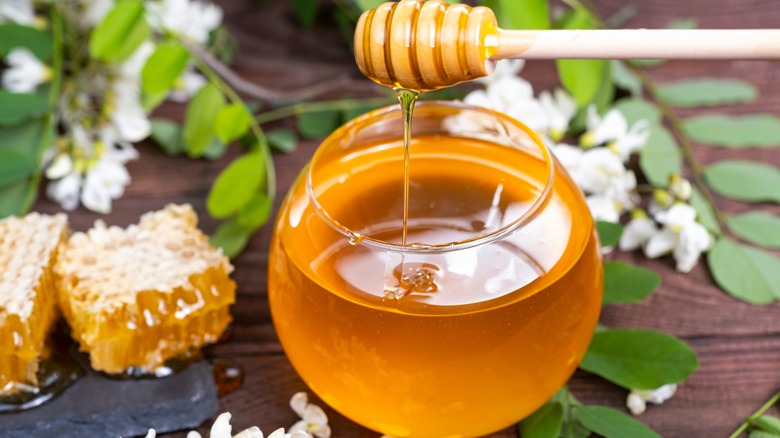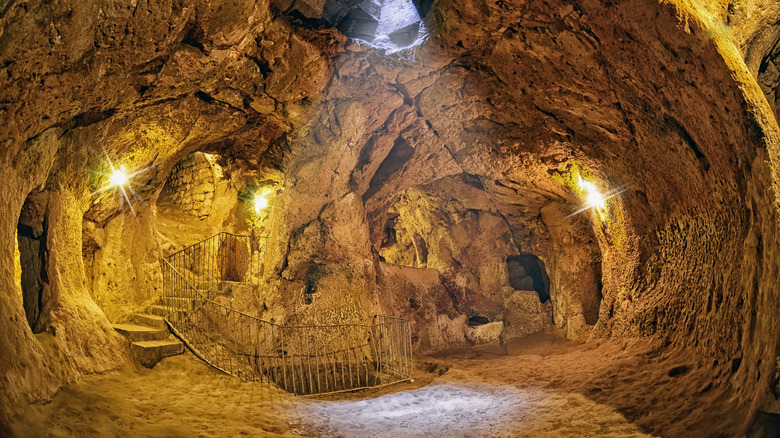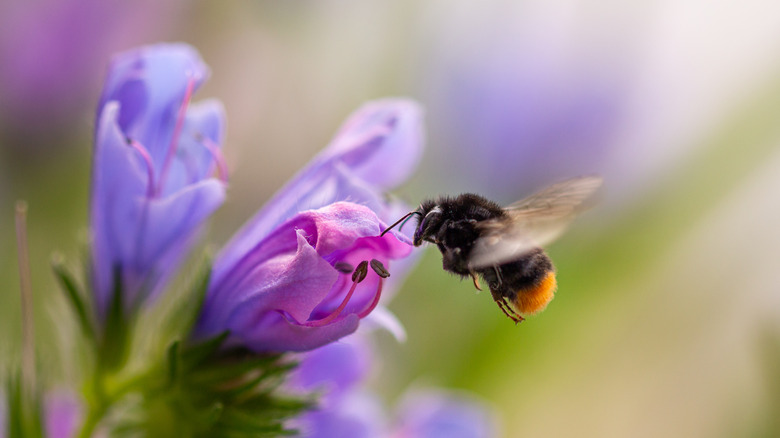The Turkish Caves That Produce The World's Most Expensive Honey
Winnie the Pooh loves it. Bees spend their lives making and devouring the sweet nectar. And the ABBA song "Honey, Honey" should make you think about it. While our ancestors are believed to have started eating honey as early as 2.5 million years ago, the sweet fluid that is gathered from flowers, processed by insects, and harvested by humans remains a popular staple around the world. If you generally think of honey as simply a nice addition to tea or recipes like honey lavender ice cream and honey glazed ham, you may not have heard of the Turkish honey that has been dubbed "the most expensive in the world."
Sold in elegant glass bottles that resemble potion jars from the "Harry Potter" films, the exclusive nectar is described by the website for Centauri Honey as "the most coveted honey in the world, sought out by doctors, royals, and celebrities alike." In 2021, the Guinness World Records website established that the honey, named after one of the constellations, Centaurus, is the costliest on earth. Produced by Turkish researcher and entrepreneur Ahmet Eren Çakır, the honey previously sold for more than $10,000 per kilogram, and is retrieved from caves and rocks between 1,900 and 3,000 meters above sea level. Typically, it is only possible to extract about 10 to 15 kilograms of the honey each year. A YouTube video promoting Centauri Honey resembles a trailer for the latest Hollywood blockbuster.
Cave scaling to acquire the world's most expensive honey
According to the video, acquiring Centauri Honey can be dangerous. The caves are located 50 kilometers from the closest citizens' homes. Speleologists, or scientists who study caves, climb up to 20 meters to look for spots that might contain the honey. As the video's narrator states, the climbers have "only their ropes and their wits to keep them alive in such a harsh and unforgiving environment." Hyperbole aside, cave scaling in the Black Sea region of Turkey to gather a seeming elixir sounds like something out of an adventure novel. But there's also some science involved.
Owner Ahmet Eren Çakır works with researchers to examine how the honey may improve people's health. Each container gets sent to the Turkish Scientific Council to be studied in a lab. Because of its exacting production methods, it can take months for someone seeking the honey to get a sample. Luckily, honey never goes bad.
Although it can be challenging to acquire, the honey has been found to contain ample amounts of magnesium, potassium, flavonoids, and antioxidants. According to Thrive, Eren Çakır claims that "since Centauri Honey has the high phenol levels, flavonoid levels, antioxidant levels, which fight diseases and since I use special endemic herbs, Centauri Honey has amazing effects on general health and aging as well as preventative properties." Those who are wealthy enough have been able to explore its possible benefits since 2018.
What makes Turkish cave honey so rare?
Even the bees that help produce the honey are fairly exclusive. The colony is secluded from people and other bee colonies to avoid the varroa mite, a parasite that infects bees and limits honey production. Herbs and other plants with medicinal properties, rather than pesticides, are used to keep unwanted pests away organically.
Prices on the Centauri Honey website vary by rarity and start at $6,500 per kilogram. Those seeking the most exclusive package — which costs more than $1 million — get access to monofloral "Emerald" honey, plus a video that illustrates how it's extracted and a certificate from the European Research Center. While Centauri Honey holds a Guinness World Record title, other types of Turkish honey are also among some of the world's most expensive honeys. Elvish Honey similarly goes for more than $6,000 per kilogram and is harvested from a 1,800-meter-deep cave in Artvin, Turkey.
In addition to being difficult to collect, Turkish cave honey is largely prized because of its potential health benefits. Although Ahmet Eren Çakır told Luxury Lifestyle Magazine that the honey's properties are meant to boost the immune system, he suggests that it may also have anti-aging properties, saying, "I have customers from all across the world who call me to thank me after receiving positive health benefits with some using my honey on their wrinkles and fine lines." On Instagram, the company notes that more research will be conducted on the honey's health impacts.


